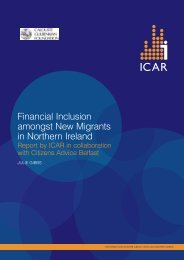Uncovered: assessing media and communications needs ... - ICAR
Uncovered: assessing media and communications needs ... - ICAR
Uncovered: assessing media and communications needs ... - ICAR
- No tags were found...
Create successful ePaper yourself
Turn your PDF publications into a flip-book with our unique Google optimized e-Paper software.
• Computers for beginners – untangling the web: exploring <strong>and</strong> explaining its potential uses• Design your own publicity – developing skills in desk top publishing• Creating your own content – how to make radio or video items for targeting community TV <strong>and</strong>radio• Writing Skills – how to write good English for different audiences <strong>and</strong> purposes6.4 Promote training• in partnership with training organisations <strong>and</strong> experts in the fi eld – build <strong>and</strong> exploit local expertise• in collaboration with local <strong>and</strong> support organisations – if they buy into the idea they may do therecruiting for you• Catching the zeitgeist – think of some creative ways of drawing in disaffected people by dressingtraining up in fun, cultural activities• Using relevant images <strong>and</strong> literature appropriate to target groups6.5 Address capacity constraints by:• Exploring ways of funding specifi c courses – securing the funds to run courses for targeted groups<strong>and</strong> aims, or offering a number of free places on each course• Providing ongoing support – by a) developing MT’s current mentoring scheme <strong>and</strong> b) exploring thepossible development of local <strong>communications</strong> ‘hubs’ in key towns <strong>and</strong> cities or regions• Budgeting for <strong>media</strong> <strong>and</strong> <strong>communications</strong> training – encourage organisations to include anallowance for training in funding applications• Using local expertise <strong>and</strong> exploring the potential for cascading skills• Encouraging cooperation <strong>and</strong> planning across sectors at local level – for example geared towardsjoint training initiatives6.6 Special issues• A series of events to tackle misrepresentation – a more strategic approach to address the lack oftrust <strong>and</strong> underst<strong>and</strong>ing, <strong>and</strong> build bridges between frontline groups <strong>and</strong> the <strong>media</strong>. The eventswould bring together individuals <strong>and</strong> journalists to discuss the grievances of the former <strong>and</strong>constraints on the latter <strong>and</strong> search for a way forward in an open forum.6.7 Evaluation• Evaluate courses for their impact over time – for example ask participants to complete formsindicating their current scale of <strong>media</strong>/<strong>communications</strong> activities <strong>and</strong> contact them again in sixmonths/a year to gauge progress against measurements such as newspaper coverage, volunteernumbers, donations, website hits.6.8 Suggestions for further studies• Identifi cation of good practise about the ways different organisations publicise their work <strong>and</strong> tacklemisrepresentation• The effectiveness of training courses on organisations’ <strong>media</strong> <strong>and</strong> <strong>communications</strong> activities<strong>Uncovered</strong>: <strong>assessing</strong> <strong>media</strong> <strong>and</strong> <strong>communications</strong> <strong>needs</strong> <strong>and</strong> capacity of marginalised communities43
















